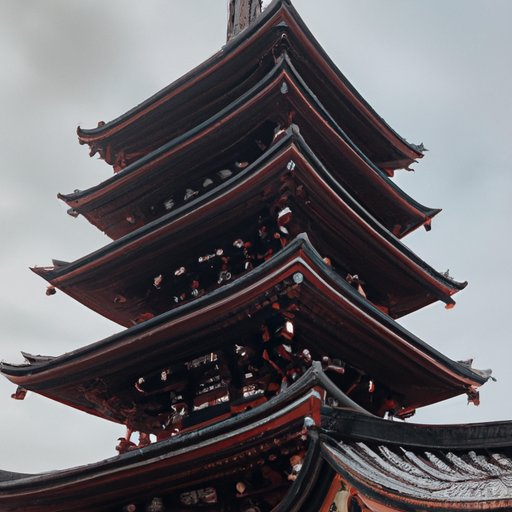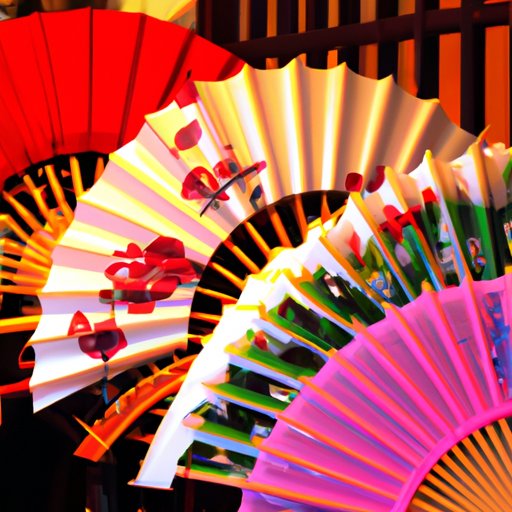Introduction
Culture is a complex concept that encompasses many different aspects of a society. It includes language, religion, art, music, customs, beliefs, values, and much more. Japan is a country with a rich and diverse culture that has been evolving since the earliest days of its history. From traditional holiday celebrations and ancient arts and crafts to the influence of religion and technology, this article explores the unique culture of Japan.

Exploring the Unique Cultural Traditions of Japan
The culture of Japan is rooted in many traditions that have been passed down through generations. One of the most important holidays celebrated in Japan is New Year’s Day (oshogatsu). On this day, many people visit shrines and temples to pray for good luck in the coming year. Another traditional holiday is Doll’s Festival (Hinamatsuri), which is celebrated on March 3rd and honors young girls. On this day, families display dolls dressed in traditional clothing to bring happiness and prosperity to their daughters.
Arts and crafts are also an important part of Japanese culture. Traditional Japanese art forms include ceramics, papermaking, woodwork, calligraphy, painting, and origami. These art forms have been practiced for centuries, and they continue to be appreciated in modern-day Japan.
Religion is another integral part of Japanese culture. Shintoism, Buddhism, and Christianity are all practiced in Japan, and each religion has had a significant impact on the cultural identity of the country.

A Closer Look at the Ancient Art and Crafts of Japan
Japanese ceramics have a long and distinguished history, with some of the oldest pieces dating back to the Jomon period (14,000–300 BCE). Pottery and porcelain remain popular today, and many potters specialize in creating traditional works of art.
Papermaking is another ancient craft that has been practiced in Japan for centuries. The process of making handmade paper involves soaking, beating, and pressing plant fibers such as bamboo and rice straw. This paper is then used to make a variety of items, including origami and calligraphy.
Woodworking is a skill that has been passed down through generations in Japan. Woodworkers create furniture, sculptures, and other items from a variety of woods, including cedar and cypress. The art of woodworking is still widely practiced in Japan today.

Understanding the Complex Social Hierarchy of Japanese Society
Throughout its history, Japan has been governed by a complex social hierarchy. At the top of the hierarchy is the Emperor, who is seen as a symbol of unity and power. Below the emperor is the Samurai warrior class, which served as the military arm of the government and was responsible for protecting the country. The merchant class was next in the hierarchy, followed by the peasantry and finally the outcastes.
Examining the History of Japanese Cuisine and its Impact on Culture
Japanese cuisine is one of the most popular and influential cuisines in the world. Regional specialties vary greatly throughout the country, with dishes such as sushi, ramen, tempura, and soba noodles being particularly popular. There has also been a great deal of influence from foreign cuisines, such as Chinese and Korean, which have helped to shape the culinary landscape of Japan. Today, Japanese cuisine continues to evolve, with new dishes and cooking techniques emerging all the time.
Investigating the Influence of Religion on Japan’s Cultural Identity
Religion has been an integral part of Japanese culture for centuries. Shintoism is the indigenous religion of Japan and is based on the worship of nature spirits known as kami. Buddhism was introduced to Japan in the 6th century and has become an important part of the cultural identity. Christianity arrived in the 16th century and is practiced by a small but growing number of people in Japan. All of these religions have played a role in shaping the culture of Japan.
Analyzing the Role of Technology in Japan’s Rapidly Evolving Culture
Technology has had a profound impact on the culture of Japan. Automation, robotics, and artificial intelligence are just some of the technologies that have been embraced by the country in recent years. These technologies have enabled Japan to become one of the leading nations in terms of technological advancement, and they have had a major influence on the culture of the country.
Exploring How Contemporary Pop Culture is Shaping Japan’s Future
Contemporary Japanese pop culture has become increasingly influential around the world. Anime, video games, and music are some of the most popular genres, and they have spawned a massive fan base both within Japan and abroad. These genres have become an important part of Japanese culture and are helping to shape the future of the country.
Conclusion
This article explored the unique culture of Japan, from traditional holiday celebrations and ancient art and craftsmanship to the influence of religion and technology on Japanese culture. Whether it is traditional or modern, the culture of Japan is vibrant and ever-evolving. It is a fascinating and complex culture that is sure to captivate anyone who takes the time to explore it.
(Note: Is this article not meeting your expectations? Do you have knowledge or insights to share? Unlock new opportunities and expand your reach by joining our authors team. Click Registration to join us and share your expertise with our readers.)
